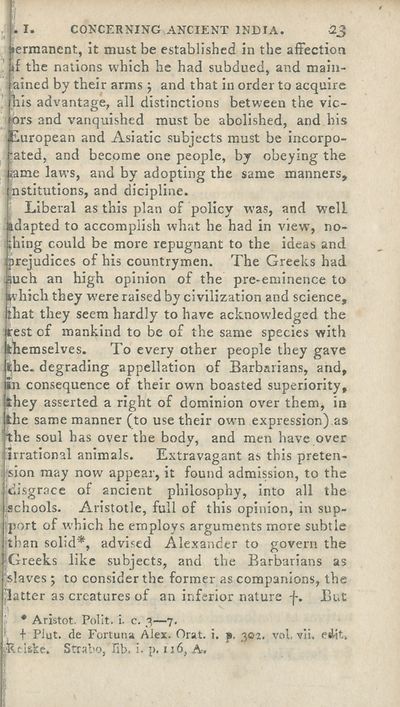Occupations > Historical disquisition concerning the knowledge which the ancients had of India; and the progress of trade with that country
(37)
Download files
Complete book:
Individual page:
Thumbnail gallery: Grid view | List view

.1. CONCERNING ANCIENT INDIA. 23
lermanent, it must be established in the affection
if the nations which he had subdued, and main-
ained by their arms j and that in order to acquire
his advantage, all distinctions between the vic-
prs and vanquished must be abolished, and his
I European and Asiatic subjects must be incorpo-
jated, and becpme one people, by obeying the
| jame laws, and by adopting the same manners,
institutions, and dicipline.
Liberal as this plan of policy was, and well
idapted to accomplish what he had in view, no-
ihing could be more repugnant to the ideas and
j irejudices of his countrymen. The Greeks had
i luch an high opinion of the pre-eminence to
jvhich they were raised by civilization and science,
that they seem hardly to have acknowledged the
rest of mankind to be of the same species with
themselves. To every other people they gave
^he. degrading appellation of Barbarians, and,
in consequence of their own boasted superiority,
Ithey asserted a right of dominion over them, in
the same manner (to use their own expression) as
the soul has over the body, and men have over
Irrational animals. Extravagant as this preten-
ision may now appear, it found admission, to the
disgrace of ancient philosophy, into all the
ischools. Aristotle, full of this opinion, in sup-
fport of which he employs arguments more subtle
than solid*, advised Alexander to govern the
Greeks like subjects, and the Barbarians as
‘slaves ; to consider the former as companions, the
jlatter as creatures of an inferior nature -j-. But
* Aristot. Polit. i. c. p,—7.
lermanent, it must be established in the affection
if the nations which he had subdued, and main-
ained by their arms j and that in order to acquire
his advantage, all distinctions between the vic-
prs and vanquished must be abolished, and his
I European and Asiatic subjects must be incorpo-
jated, and becpme one people, by obeying the
| jame laws, and by adopting the same manners,
institutions, and dicipline.
Liberal as this plan of policy was, and well
idapted to accomplish what he had in view, no-
ihing could be more repugnant to the ideas and
j irejudices of his countrymen. The Greeks had
i luch an high opinion of the pre-eminence to
jvhich they were raised by civilization and science,
that they seem hardly to have acknowledged the
rest of mankind to be of the same species with
themselves. To every other people they gave
^he. degrading appellation of Barbarians, and,
in consequence of their own boasted superiority,
Ithey asserted a right of dominion over them, in
the same manner (to use their own expression) as
the soul has over the body, and men have over
Irrational animals. Extravagant as this preten-
ision may now appear, it found admission, to the
disgrace of ancient philosophy, into all the
ischools. Aristotle, full of this opinion, in sup-
fport of which he employs arguments more subtle
than solid*, advised Alexander to govern the
Greeks like subjects, and the Barbarians as
‘slaves ; to consider the former as companions, the
jlatter as creatures of an inferior nature -j-. But
* Aristot. Polit. i. c. p,—7.
Set display mode to:
![]() Universal Viewer |
Universal Viewer | ![]() Mirador |
Large image | Transcription
Mirador |
Large image | Transcription
| Antiquarian books of Scotland > Occupations > Historical disquisition concerning the knowledge which the ancients had of India; and the progress of trade with that country > (37) |
|---|
| Permanent URL | https://digital.nls.uk/125576217 |
|---|
| Description | Thousands of printed books from the Antiquarian Books of Scotland collection which dates from 1641 to the 1980s. The collection consists of 14,800 books which were published in Scotland or have a Scottish connection, e.g. through the author, printer or owner. Subjects covered include sport, education, diseases, adventure, occupations, Jacobites, politics and religion. Among the 29 languages represented are English, Gaelic, Italian, French, Russian and Swedish. |
|---|

